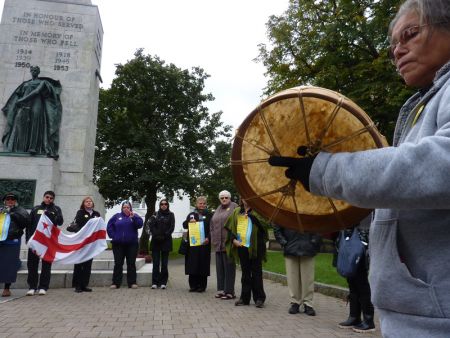K'JIPUKTUK (HALIFAX)--It's an exciting day for Jeremy Meawasige, a young Pictou Landing First Nation teenager with multiple disabilities, his mother, Maurina Beadle, and Philippa Pictou, Health Director for Pictou Landing.
"I'm so excited, I could hardly sleep [last night], and every time I fell sleep, I dreamed about Jordan's Principle," said Pictou by phone this morning.
In a historic ruling by the Supreme Court, the Pictou Landing Band Council will be reimbursed for all costs associated with caring for Jeremy while he lives with his mother--who three years ago had a double stroke that left her unable to continue caring for her son as she had been doing for his whole life.
Jeremy's case was heard in Nova Scotia in June, 2012. It was the first time that Jordan's Principle, a child-first policy designed to ensure that First Nations children receive the same health care that non-Native kids do, was invoked. The Principle was passed unanimously in the House of Commons in 2007 after Jordan River Anderson, a Cree child in Manitoba, died in hospital while waiting for the provincial and federal governments to duke it out over which level of government was responsible for paying for his home care. In spite of broad support, Jordan's Principle has never been implemented in Canada.
The court victory has widespread implications for cases similar to Jeremy's across Canada.
"It's so exciting that children across the country will now be able to access the care they need through Jordan's Principle," said Pictou.
The ruling, as a precedent, also has the potential to open up cases in other social services where First Nations people tend to fall through jurisdictional cracks because of their Aboriginal status.
The major challenge in cases of jurisdictional disputes--where levels of government argue over which is responsible for funding a given situation--often hinge on the denial of the existence of a jurisdictional dispute. Such was the argument by the crown in Jeremy's case, which outlined agreement between the federal and provincial governments about how much funding Pictou Landing Band Council ought to receive to support Beadle and her son on-reserve--but that amount was less than what was granted to an off-reserve child in Nova Scotia in a previous case. As Justice Mandamin (the only First Nations judge on the federal bar) states in his ruling on Jeremy's case:
"I do not think the principle in a Jordan's Principle case is to be read narrowly. The absence of a monetary dispute cannot be determinative where officials of both levels of government maintain an erroneous position on what is available to persons in need...and both then assert there is no jurisdictional dispute."
He goes on to say, "Jordan's Principle would have been meant to include services for exceptional cases...While there is an administratively prescribed maximum...for in-home services in Nova Scotia, the statutorily mandated policy has been found to encompass exceptional cases that may exceed that minimum."
Pictou recently returned from a conference on Jordan's Principle in Manitoba, where health workers and First Nations groups gathered to strategize around building better health care systems for First Nations children, discussing in particular the potential power of Jordan's Principle. Pictou is not unambitious about the implications of yesterday's court ruling.
"Implementing Jordan's Principle is about haivng good relationships between government and First Nations, which is what the Idle No More movement is all about," said Pictou. "So this is another opportunity for us to build better relationships with governemnt to provide better care for children who need it."
Maurina Beadle was unavailable for interview at the time of publication, but sources say she is "over the moon" with the news of the victory.
For backgrounders about Jeremy, Maurina and the court case, see previous coverage in The Dominion and the Halifax Media Co-op:
It's a Matter of Jordan's Principle
Circle of Strength Offered in Halifax to Women Fighting for Jordan's Principle
Maurina Beadle in Court Today for Jordan's Principle and First Nations Children
"Boudreau is the Law": The legal nature of an exception, and health care for First Nations children




